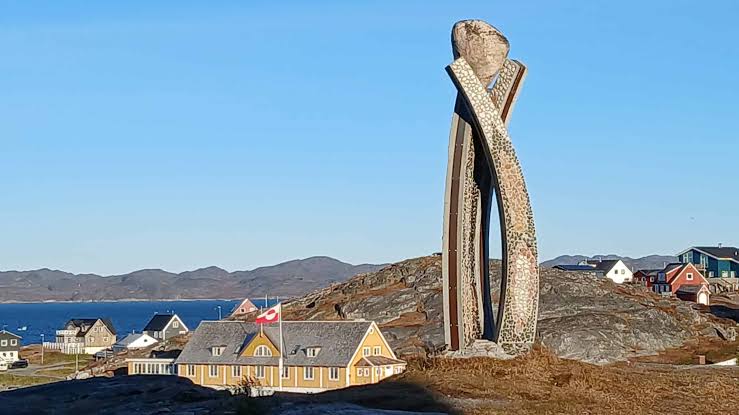Greenland’s future between sovereignty and global interests

By Anita Mathur
Tech billionaire Elon Musk recently stirred the pot on the geopolitically sensitive topic of Greenland’s sovereignty.
Responding to a poll from the University of Copenhagen indicating that most Greenlanders favor independence, Musk tweeted: “If the people of Greenland want to be part of America, which I hope they do, they would be most welcome!” Musk’s remarks came on the heels of US President-elect Donald Trump’s renewed interest in acquiring Greenland, an idea he previously floated during his first term in 2019.
While Trump’s initial proposal was met with ridicule and rejection from both Greenland and Denmark, the incoming administration’s revived enthusiasm has reignited the debate over the island’s future.
Greenland, an autonomous territory under Danish control since 1979, boasts a population of approximately 60,000 and an economy heavily reliant on fishing and small-scale tourism.
Yet, its significance extends far beyond its modest economic footprint. Geographically positioned between North America and Europe, Greenland’s vast ice-covered landmass offers a critical vantage point over the Arctic’s increasingly navigable shipping lanes.
As climate change melts Arctic ice, these routes are becoming vital for global trade and military strategy. Additionally, Greenland is believed to possess untapped reserves of oil, gas, and rare-earth minerals, further amplifying its value on the global stage.
From a defense perspective, Greenland’s location is pivotal. The US already operates the Thule Air Base in the island’s north, a cornerstone of NATO’s missile defense and early warning systems. Control over Greenland would enhance Washington’s strategic reach in the Arctic, providing a significant advantage in countering Russian and Chinese ambitions in the region.
Trump’s push to acquire Greenland reflects a broader trend of US administrations seeking to bolster their Arctic presence. In a recent statement, the president-elect described Greenland as an “absolute necessity” for national security, citing its strategic importance in defending against potential adversaries.
During his first term, Trump’s 2019 proposal to buy Greenland was widely dismissed as unrealistic and imperialistic. Both Greenland’s government and Danish Prime Minister Mette Frederiksen rejected the idea outright, with Frederiksen calling it “absurd.”
Despite the initial backlash, Trump’s renewed interest appears to be gaining traction within Washington’s defense circles. According to Axios, Denmark has privately communicated a willingness to discuss expanding the US military presence on the island.
Such discussions could mark a significant shift in the diplomatic landscape, potentially paving the way for deeper US involvement in Greenland’s affairs.
The prospect of US acquisition is further complicated by Greenland’s own aspirations for greater sovereignty.
Since gaining self-governance in 1979, the island has steadily increased its autonomy from Denmark, handling most domestic affairs independently while Copenhagen retains control over defense and foreign policy.
Prime Minister Mute Egede, while rejecting the idea of selling Greenland, emphasized the island’s desire for self-determination. “We have a desire for independence, a desire to be the master of our own house,” Egede stated, urging respect for Greenland’s aspirations.
A 2019 poll revealed that 67.8% of Greenlanders support independence from Denmark within the next two decades. However, the path to full sovereignty is fraught with economic and political challenges.
Greenland’s reliance on Danish subsidies, which account for roughly a quarter of its GDP, poses a significant obstacle to financial independence. Moreover, the island’s small population and limited infrastructure would make it difficult to sustain a fully autonomous state without external support.
The debate over Greenland’s future has far-reaching implications for global geopolitics. For the United States, acquiring Greenland-or at least securing a more robust military presence-would bolster its position in the Arctic, a region increasingly contested by major powers.
Russia has been expanding its military footprint in the Arctic, while China has declared itself a “near-Arctic state” and invested heavily in the region’s infrastructure and resource extraction.
For Denmark, Greenland represents both a strategic asset and a symbol of national unity. Selling the island to the US would not only weaken Copenhagen’s standing in the Arctic but also risk sparking domestic and international backlash.
Additionally, such a move could strain Denmark’s relations with its NATO allies, some of whom may view the acquisition as an overreach of American power.
From Greenland’s perspective, increased US involvement could bring economic and infrastructure development but also risks undermining its aspirations for independence.
Balancing its relationships with Denmark, the US, and other international players will be crucial for Greenland as it navigates this complex geopolitical landscape.
The idea of purchasing Greenland harks back to a bygone era of territorial acquisitions. The United States has a history of buying strategically significant land, from the Louisiana Purchase in 1803 to the acquisition of Alaska from Russia in 1867.
However, the contemporary international system, governed by principles of sovereignty and self-determination, makes such transactions highly contentious.Critics argue that Trump’s proposal undermines these principles, reducing Greenland’s people to mere pawns in a geopolitical chess game.
Proponents, on the other hand, contend that a US acquisition could bring significant economic and strategic benefits to both parties, provided it is conducted with Greenlanders’ consent.
As the debate over Greenland’s future continues, key questions remain unanswered. Will the US push for a formal acquisition, or will it settle for an expanded military presence?
How will Denmark balance its strategic interests with its commitment to Greenland’s autonomy? And most importantly, what role will the people of Greenland play in determining their own destiny?
For now, Prime Minister Egede’s stance reflects a cautious but open approach: rejecting outright sale while remaining willing to engage in dialogue. “We are ready to talk,” he said, signaling that Greenland’s leaders understand the importance of engaging with powerful stakeholders like the US.
Ultimately, Greenland’s future will depend on its ability to navigate the competing interests of major powers while staying true to its aspirations for self-determination.
Whether it becomes a US territory, achieves full independence, or remains an autonomous part of Denmark, the island’s role in global geopolitics is set to grow in the years to come.
Source : Blitz




